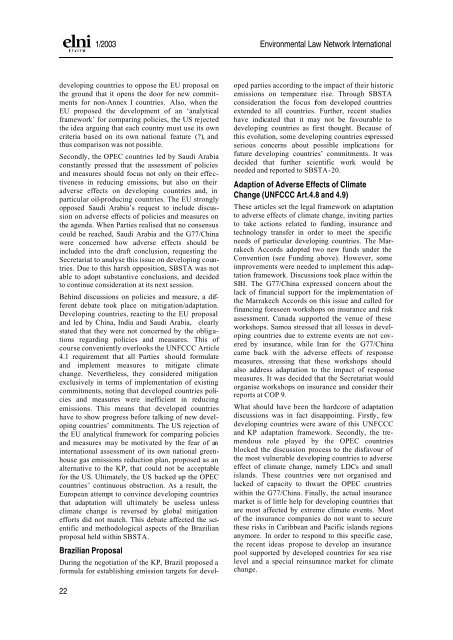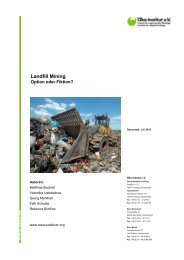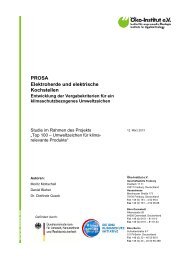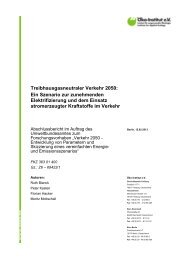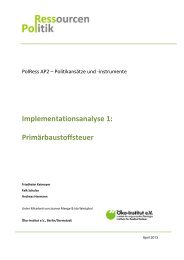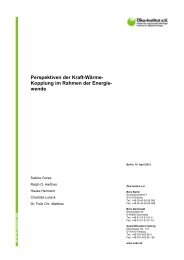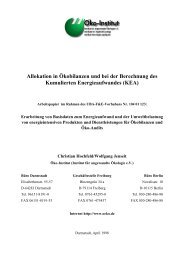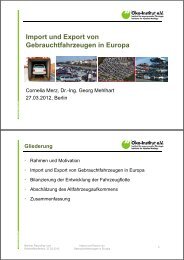elni NEWS - Öko-Institut eV
elni NEWS - Öko-Institut eV
elni NEWS - Öko-Institut eV
Create successful ePaper yourself
Turn your PDF publications into a flip-book with our unique Google optimized e-Paper software.
22<br />
1/2003 Environmental Law Network International<br />
developing countries to oppose the EU proposal on<br />
the ground that it opens the door for new commitments<br />
for non-Annex I countries. Also, when the<br />
EU proposed the development of an ‘analytical<br />
framework’ for comparing policies, the US rejected<br />
the idea arguing that each country must use its own<br />
criteria based on its own national feature (?), and<br />
thus comparison was not possible.<br />
Secondly, the OPEC countries led by Saudi Arabia<br />
constantly pressed that the assessment of policies<br />
and measures should focus not only on their effectiveness<br />
in reducing emissions, but also on their<br />
adverse effects on developing countries and, in<br />
particular oil-producing countries. The EU strongly<br />
opposed Saudi Arabia’s request to include discussion<br />
on adverse effects of policies and measures on<br />
the agenda. When Parties realised that no consensus<br />
could be reached, Saudi Arabia and the G77/China<br />
were concerned how adverse effects should be<br />
included into the draft conclusion, requesting the<br />
Secretariat to analyse this issue on developing countries.<br />
Due to this harsh opposition, SBSTA was not<br />
able to adopt substantive conclusions, and decided<br />
to continue consideration at its next session.<br />
Behind discussions on policies and measure, a different<br />
debate took place on mitigation/adaptation.<br />
Developing countries, reacting to the EU proposal<br />
and led by China, India and Saudi Arabia, clearly<br />
stated that they were not concerned by the obligations<br />
regarding policies and measures. This of<br />
course conveniently overlooks the UNFCCC Article<br />
4.1 requirement that all Parties should formulate<br />
and implement measures to mitigate climate<br />
change. Nevertheless, they considered mitigation<br />
exclusively in terms of implementation of existing<br />
commitments, noting that developed countries policies<br />
and measures were inefficient in reducing<br />
emissions. This means that developed countries<br />
have to show progress before talking of new developing<br />
countries’ commitments. The US rejection of<br />
the EU analytical framework for comparing policies<br />
and measures may be motivated by the fear of an<br />
international assessment of its own national greenhouse<br />
gas emissions reduction plan, proposed as an<br />
alternative to the KP, that could not be acceptable<br />
for the US. Ultimately, the US backed up the OPEC<br />
countries’ continuous obstruction. As a result, the<br />
European attempt to convince developing countries<br />
that adaptation will ultimately be useless unless<br />
climate change is reversed by global mitigation<br />
efforts did not match. This debate affected the scientific<br />
and methodological aspects of the Brazilian<br />
proposal held within SBSTA.<br />
Brazilian Proposal<br />
During the negotiation of the KP, Brazil proposed a<br />
formula for establishing emission targets for devel-<br />
oped parties according to the impact of their historic<br />
emissions on temperature rise. Through SBSTA<br />
consideration the focus from developed countries<br />
extended to all countries. Further, recent studies<br />
have indicated that it may not be favourable to<br />
developing countries as first thought. Because of<br />
this evolution, some developing countries expressed<br />
serious concerns about possible implications for<br />
future developing countries’ commitments. It was<br />
decided that further scientific work would be<br />
needed and reported to SBSTA-20.<br />
Adaption of Adverse Effects of Climate<br />
Change (UNFCCC Art.4.8 and 4.9)<br />
These articles set the legal framework on adaptation<br />
to adverse effects of climate change, inviting parties<br />
to take actions related to funding, insurance and<br />
technology transfer in order to meet the specific<br />
needs of particular developing countries. The Marrakech<br />
Accords adopted two new funds under the<br />
Convention (see Funding above). However, some<br />
improvements were needed to implement this adaptation<br />
framework. Discussions took place within the<br />
SBI. The G77/China expressed concern about the<br />
lack of financial support for the implementation of<br />
the Marrakech Accords on this issue and called for<br />
financing foreseen workshops on insurance and risk<br />
assessment. Canada supported the venue of these<br />
workshops. Samoa stressed that all losses in developing<br />
countries due to extreme events are not covered<br />
by insurance, while Iran for the G77/China<br />
came back with the adverse effects of response<br />
measures, stressing that these workshops should<br />
also address adaptation to the impact of response<br />
measures. It was decided that the Secretariat would<br />
organise workshops on insurance and consider their<br />
reports at COP 9.<br />
What should have been the hardcore of adaptation<br />
discussions was in fact disappointing. Firstly, few<br />
developing countries were aware of this UNFCCC<br />
and KP adaptation framework. Secondly, the tremendous<br />
role played by the OPEC countries<br />
blocked the discussion process to the disfavour of<br />
the most vulnerable developing countries to adverse<br />
effect of climate change, namely LDCs and small<br />
islands. These countries were not organised and<br />
lacked of capacity to thwart the OPEC countries<br />
within the G77/China. Finally, the actual insurance<br />
market is of little help for developing countries that<br />
are most affected by extreme climate events. Most<br />
of the insurance companies do not want to secure<br />
these risks in Caribbean and Pacific islands regions<br />
anymore. In order to respond to this specific case,<br />
the recent ideas propose to develop an insurance<br />
pool supported by developed countries for sea rise<br />
level and a special reinsurance market for climate<br />
change.


